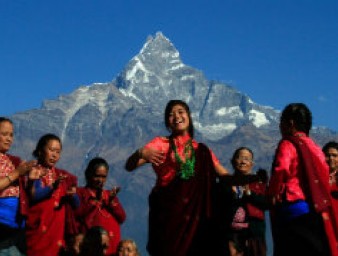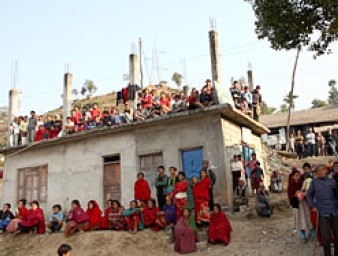Helping Nepal achieve lasting peace
04 January 2013

"Victims have the rights to justice, to truth, to a remedy and reparations and any Truth and Reconciliation Commission needs to respect these rights,” said UN Human Rights Chief Navi Pillay referring to an ordinance proposed by the Government of Nepal and submitted to the country President for promulgation.
The Ordinance on Investigation of Disappeared People(PDF), dated August 2012, would empower the country’s Truth and Reconciliation Commission to grant amnesties to perpetrators of crimes and gross violations committed during the internal conflict that took place between the Government and the Communist Party of Nepal (1996-2006).
The ordinance would give the Commission the competence to recommend to the Government the granting of amnesties, including for crimes under international law. Additionally, the Commission would have the power to initiate reconciliation processes in the absence of an application from the victim or the perpetrator.
Concerned that the current version of the ordinance does not comply with several important principles of International law, Pillay recently issued an analysis of the ordinance to be shared with the major stakeholders in the Nepali transitional justice process. “I am concerned that the proposed provisions of this Ordinance grant the Commission full power to grant amnesties without the participation of the victim and could prevent the truth of past events from coming to light,” she said.
The analysis sets out the primary principles under international law for a transitional justice process, emphasizing that States should refrain from granting amnesties for gross violations of human rights. It also highlights the fact that the provisions of the ordinance are inconsistent with Nepal’s legal obligations under international law.
According to the analysis, the ability of the Commission to initiate a reconciliation process in the absence of an explicit request by the victim or the perpetrator is a matter of serious concern. In fact, human rights principles require that reconciliation processes have the consent of both the victims and of the offenders. Furthermore, States have a duty to investigate and prosecute gross violations of international human rights law and serious violations of international humanitarian law.
“Peace will only be achieved through the pursuit of justice and the ending of impunity,” Pillay said acknowledging the progress made in Nepal’s peace process so far, but warned this could be undermined if impunity is allowed to prevail. “The parties in Nepal may think that an amnesty is a short-cut towards peace, but experience has shown that, in fact, amnesties can impede reconciliation and stability.”
In particular, Pillay urged political leaders in Nepal to respect the prohibition in international law against amnesties for gross human rights violations. She stressed that her Office remained ready to assist the Government of Nepal to fulfil its human rights obligations and implement a comprehensive transitional justice process.
The UN Human Rights Office is committed to supporting Nepal to build a sustainable and lasting peace. In support of the transitional justice process in the country, the Office will issue a series of technical advisory notes within the framework of international law over the next year.
4 January 2013

VIEW THIS PAGE IN:



